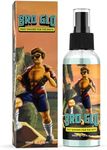Buying Guide for the Best Face Self Tanner
Choosing the right face self-tanner can be a game-changer for achieving a natural, sun-kissed glow without the harmful effects of UV rays. The key to finding the best product for you lies in understanding your skin type, desired outcome, and how different formulations work. Here are some important specifications to consider when selecting a face self-tanner.FormulationFace self-tanners come in various formulations such as lotions, creams, gels, mousses, and drops. The formulation affects how the product is applied and how it feels on your skin. Lotions and creams are typically more hydrating and suitable for dry skin, while gels and mousses are lighter and may be better for oily or combination skin. Drops can be mixed with your regular moisturizer for a customizable tan. Choose a formulation that matches your skin type and application preference.
Color GuideSome self-tanners include a color guide, which is a tint that shows where you have applied the product. This can help ensure even application and prevent streaks. If you are new to self-tanning or want to avoid mistakes, a product with a color guide might be beneficial. However, if you prefer a more subtle application process, you might opt for a clear formula.
Development TimeDevelopment time refers to how long it takes for the self-tanner to develop its full color on your skin. This can range from a few hours to overnight. If you need a quick tan for an event, look for a fast-developing product. For a more gradual and buildable tan, choose a product that develops over several hours or overnight. Consider your schedule and how quickly you need results when selecting a self-tanner.
LongevityLongevity indicates how long the tan will last before it starts to fade. This can vary from a few days to over a week. If you want a tan that lasts longer, look for products that are known for their durability. Keep in mind that exfoliating and moisturizing your skin can help extend the life of your tan. Choose a product based on how often you are willing to reapply it.
Skin Type CompatibilityDifferent self-tanners are formulated for different skin types. Some are designed specifically for sensitive skin and are free from common irritants like fragrances and alcohol. Others may contain additional moisturizing ingredients for dry skin or oil-control properties for oily skin. Identify your skin type and any specific concerns you have, such as sensitivity or acne, and choose a product that addresses those needs.
IngredientsThe ingredients in a self-tanner can affect its performance and how it interacts with your skin. Look for products with natural and nourishing ingredients like aloe vera, vitamin E, and hyaluronic acid, which can help keep your skin hydrated and healthy. Avoid products with harsh chemicals or allergens if you have sensitive skin. Reading the ingredient list can help you choose a product that is both effective and gentle on your skin.
ScentThe scent of a self-tanner can be an important factor, especially if you are sensitive to smells. Some self-tanners have a strong odor due to the active ingredient DHA, while others are formulated to be fragrance-free or have a pleasant scent. If you are concerned about the smell, look for reviews or product descriptions that mention the scent, and choose one that suits your preference.

















